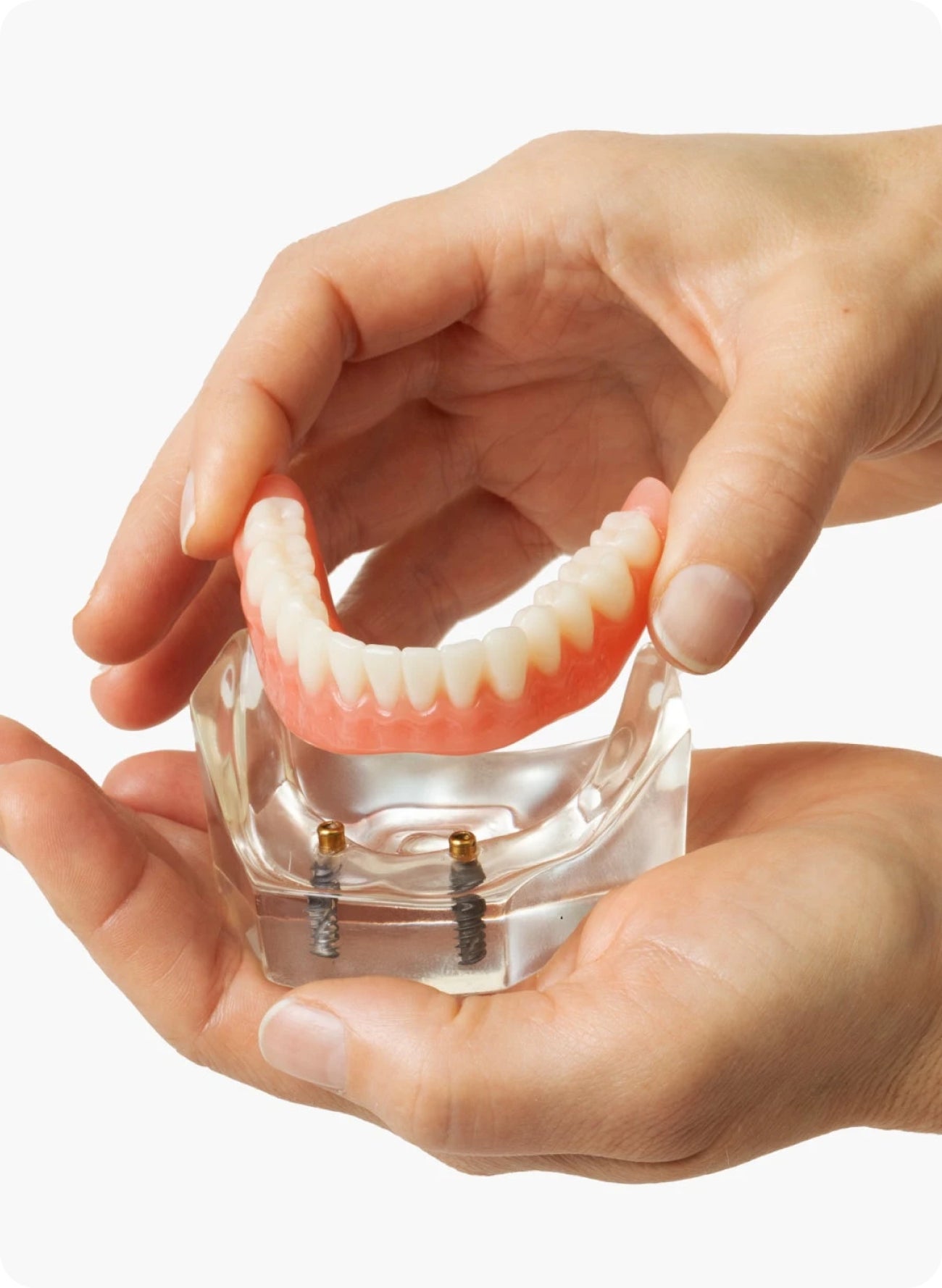Last updated 09.10.2025
Your guide to tooth erosion: causes, signs and treatments
Tooth erosion thins enamel and harms your smile. Learn causes, signs, and treatment options from Aspen Dental experts.

Your smile is a big part of who you are. But did you know that some of your favorite foods and drinks, like morning coffee or citrus fruits, can slowly wear away tooth enamel? This process is called tooth erosion, and many people don’t realize it’s happening until the damage is already done.
This guide will help you understand what causes tooth erosion, how to spot the early signs and what treatment options are available. At Aspen Dental, we believe knowledge is power—and our goal is to give you the tools to protect your oral health for a lifetime of confident smiles.
What is tooth erosion?
How it happens
Tooth erosion is the wearing away of your tooth enamel, which is the hard, protective outer layer of your teeth. This happens when acids come into direct contact with your teeth.
Enamel is the hardest substance in your body, but it isn't invincible. Repeated exposure to acids—either from what you eat and drink or from internal sources like stomach acid—can soften and dissolve the minerals in your enamel. Once enamel is gone, your body can't make more. That's why catching it early and preventing it is so important.
Tooth erosion vs. tooth decay
It's easy to confuse tooth erosion with tooth decay, but they are different problems with different causes.
Tooth decay is caused by bacteria in your mouth. These bacteria feed on the sugars and starches you eat and produce acids. This leads to plaque buildup and eventually creates small holes, or cavities, in your teeth.
Tooth erosion, however, doesn't involve bacteria. It's a direct acid attack on your enamel from things like acidic foods, drinks or stomach acid. Instead of causing cavities in specific spots, erosion usually leads to a general thinning of the enamel across the entire tooth surface.
What causes tooth erosion?
Acidic foods and drinks
Many common foods and drinks are acidic enough to harm your enamel. Citrus fruits like lemons and oranges are high in citric acid. While they're good for your body, too much can contribute to enamel loss.
Carbonated drinks are a major source of acid. Sodas, including diet versions, contain phosphoric and citric acids. Even sports drinks and fruit juices, which can seem like healthy choices, are often very acidic. Wine, both red and white, also contains acids that can damage enamel. The longer you sip these drinks, the more time the acid has to work on your teeth.
Stomach acid and health conditions
Sometimes, the acid that causes erosion comes from inside your own body. Conditions like acid reflux or GERD (gastroesophageal reflux disease) can allow powerful stomach acid to travel up into your mouth. This acid is much stronger than what you find in food and can cause significant erosion, especially on your back teeth.
Frequent vomiting, for any reason, also brings stomach acid into contact with your teeth, leading to rapid enamel loss. If you often have sensitive teeth, heartburn or a sour taste in your mouth, it's a good idea to talk to both your doctor and your dentist.
Other factors
Other things can increase your risk of tooth erosion. Dry mouth, whether from a medical condition or as a side effect of medication, means you have less saliva. Saliva is your body's natural defense—it helps wash away and neutralize acids.
Brushing your teeth too hard, especially right after an acidic meal or drink, can also cause problems. When enamel is softened by acid, aggressive brushing can scrub it away. Finally, grinding your teeth (bruxism) can wear down enamel that has already been weakened by acid, making the damage worse.
Early signs and symptoms of tooth erosion
Tooth sensitivity
One of the first things you might notice is tooth sensitivity. As your enamel thins, the layer underneath, called dentin, becomes exposed. Dentin has tiny pathways that lead to the nerve of your tooth. This is why you might feel a sharp pain when you eat or drink something hot, cold or sweet.
This sensitivity might start small and come and go, but it often gets worse over time. If you find yourself wincing when you drink ice water or eat ice cream, it's a sign that something is wrong.
Changes in your teeth's appearance
Erosion can change how your teeth look. Your enamel is naturally whitish, but the dentin underneath is more yellow. As enamel wears away, more of this yellow dentin shows through, making your teeth appear discolored and stained.
You might also notice that your teeth look shorter or thinner. The edges of your front teeth can become transparent or almost see-through. These changes happen slowly, so you may not notice them right away.
Rounded teeth, cracks or dents
In more advanced stages, erosion can change the shape of your teeth. The edges of your front teeth might become rounded, and small chips or cracks can appear.
On your back teeth, you might see small dents or "cups" forming on the chewing surfaces. These changes can affect your bite and how your teeth fit together. Paying attention to these subtle shifts can help you catch erosion before it becomes a bigger problem.
How your diet can help
Smart food and drink choices
It's helpful to know the difference between sugary foods and acidic foods. Sugar feeds the bacteria that cause cavities, while acid directly erodes enamel. Some items, like fruit juice, are both sugary and acidic, posing a double threat.
Try to limit your intake of highly acidic foods and drinks like sodas, sports drinks, and citrus. When you do have them, enjoy them with a meal. Other foods and the extra saliva you produce while eating can help neutralize the acid. Drinking water right after an acidic meal or snack also helps rinse the acid away.
Small swaps make a big difference
You don't have to give up everything you love. Making smart swaps can protect your teeth. For example, if you enjoy citrus fruits, eat them with a piece of cheese or a glass of milk, as dairy can help neutralize acid.
Using a straw when you drink acidic beverages can help the liquid bypass your teeth, reducing direct contact. And remember to wait about 30 minutes after having something acidic before you brush your teeth. This gives your saliva time to do its job and re-harden your enamel.
Treatment options for tooth erosion
Fluoride treatments to strengthen enamel
For early-stage erosion, professional fluoride treatments are a great first line of defense. Your dentist can apply a fluoride varnish or gel to help strengthen your remaining enamel and make it more resistant to acid. They may also recommend a prescription-strength fluoride toothpaste or mouth rinse for you to use at home.
Dental bonding for repairs
If erosion has caused visible damage, like chips or worn edges, dental bonding can be a great solution. In this simple procedure, your dentist applies a tooth-colored resin to the damaged area. This not only improves the look of your teeth but also adds a protective layer over the exposed dentin, which can reduce sensitivity.
Crowns and veneers for more serious damage
When erosion is severe, more comprehensive treatments like dental crowns or veneers may be needed. A dental crown covers the entire tooth, restoring its shape, strength and function while protecting it from further damage.
Porcelain veneers are thin shells that cover the front surface of your teeth. They are an excellent option for correcting discoloration, shape and size issues caused by erosion on your front teeth. Your Aspen Dental care team will talk with you about the best solution for your specific situation.
How to prevent tooth erosion
Good brushing and rinsing habits
Good oral hygiene is key, but the right technique is important. Use a soft-bristled toothbrush and brush gently. After you eat or drink something acidic, rinse your mouth with water right away. Then, wait at least 30 minutes before brushing.
Manage health conditions
If you have acid reflux or dry mouth, managing these conditions is crucial for protecting your teeth. Work with your doctor to find a treatment plan that's right for you. To combat dry mouth, drink plenty of water throughout the day and consider chewing sugar-free gum to stimulate saliva flow.
See your Aspen Dental dentist regularly
Regular dental check-ups are your best bet for catching tooth erosion early. Your dentist at Aspen Dental can spot signs you might miss and recommend preventive steps. If you notice any sensitivity or changes in your teeth, don't wait to schedule an appointment.
A note from your Aspen Dental care team
We know that dealing with tooth erosion can feel overwhelming. The good news is that you don't have to face it alone. With Aspen Dental, you can protect your teeth with restorative treatments.
Everyone deserves access to quality, affordable dental care. That’s why Aspen Dental offices accept most insurance and offer flexible financing options through 3rd-party lenders. Plus, we create a personalized treatment plan that fits your needs and budget. Don't let anything stand in the way of getting the care you deserve. Schedule an appointment today and let us help you keep your smile healthy and bright.
Tooth erosion FAQs
What causes tooth erosion in adults?
The most common causes are acidic foods and drinks (like soda, citrus and wine) and stomach acid from conditions like acid reflux. Other factors include dry mouth, certain medications and brushing your teeth too hard, which can wear away enamel over time.
Can tooth erosion be reversed?
Once enamel is lost, it can't grow back. However, the effects of early erosion can be managed. Fluoride treatments can help strengthen the remaining enamel. For more significant damage, treatments like dental bonding or crowns can restore the tooth's appearance and function.
What foods should I avoid to protect my enamel?
Try to limit highly acidic foods and drinks, such as sodas, sports drinks, wine and citrus fruits. It’s also helpful to reduce sugary snacks. When you do have something acidic, rinse your mouth with water afterward to help neutralize the acid.
When should I see a dentist for tooth erosion?
You should see a dentist if you notice any signs of erosion, such as increased tooth sensitivity, yellowing teeth or changes in the shape or texture of your teeth. Early detection is key to preventing more serious damage, so regular six-month checkups are always a good idea.



